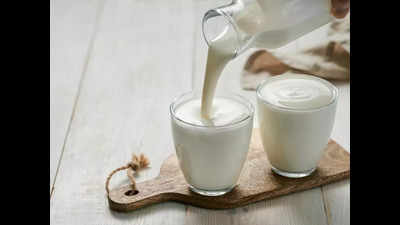

New Delhi: The capital’s bustling dairy market is in for a churn with Karnataka’s iconic Nandini Milk making its debut. It will be jostling for space with well-entrenched players like homegrown brand Mother Dairy and Amul with a strong focus on “delivering high-quality products at competitive prices”.
Over the years, brand loyalty in the city’s dairy market has been deeply rooted in familiarity and trust. This loyalty has been built through consistent product quality, widespread availability and strong marketing efforts. It is to be seen if Nandini is able to make a dent in the market and create a customer base of its own.
“We will initially supply 1 lakh litres of milk daily from Karnataka to the Delhi market, which will be distributed through local channels. Our goal is to gradually increase this volume to 10 lakh litres per day. Additionally, we are planning to open a large outlet in the city and are currently scouting for an ideal location. Once this outlet is established, we will explore further expansion opportunities,” said Karnataka Milk Federation managing director M K Jagadish, who was here for the launch of their milk and curd in Delhi-NCR on Thursday.
Currently being supplied to Karnataka, Maharashtra, Goa, Hyderabad, Chennai and Kerala, Nandini’s expansion into Delhi marks its first foray into the north Indian market. “We plan to take on the competition by providing better quality,” added Jagadish. The prices have also been set lower than the market average, he claimed.
The launch comes at a time when Mother Dairy, a dominant force in the dairy market, is celebrating its 50th anniversary in Delhi. Over the years, the brand has steadily expanded its presence, establishing numerous booths across the city and transforming them into a familiar and reassuring sight in neighbourhoods. Today, Mother Dairy operates approximately 2,500 outlets, including booths and kiosks, across Delhi-NCR, delivering 35 lakh litres of milk daily.
“With a strong presence of five decades, Mother Dairy has created and defined the dairy market of NCR. It is one of the most trusted brands and a household name in the region. We believe that the role of organised players will only help to drive growth of the dairy industry and the spirit of competition should pave the way for benefiting consumers,” said Manish Bandlish, managing director of Mother Dairy.
For many Delhiites, Amul is the go-to brand for their morning tea and coffee. Amul entered the Delhi market in 2005, positioning “fresh milk” as its unique selling point. Within just a few years, it captured a significant share of the market. At the time, Amul emphasised its “superior fresh taste”, which it claimed set it apart from competing brands that “often used recombined milk made from skimmed milk powder”.
“Delhi is the biggest milk market in the country. There is enough space for organised players. Entry of a cooperative brand is always welcome,” said Jayen Mehta, managing director of Gujarat Cooperative Milk Marketing Federation that markets dairy products under brand name Amul.
Interestingly, Amul and Nandini share a notable history, marked by the 2023 Karnataka assembly polls when a bitter milk war erupted. During the inauguration of the Mandya Mega Dairy, Union home minister Amit Shah suggested collaboration between Amul and Nandini to strengthen dairy infrastructure across India. His remark was interpreted as a potential merger, raising concerns about Nandini’s autonomy. The conflict further escalated with a tweet from Amul announcing plans to start online deliveries in Bengaluru, a move that sparked a backlash and protests from supporters of Nandini.
Nandini’s entry into Delhi is not the first instance of a prominent regional brand expanding into the capital. Verka of Punjab State Cooperative Milk Producers’ Federation and Sudha Dairy of Bihar State Milk Cooperative Federation have also made attempts to establish a foothold in Delhi’s competitive dairy market.
“We had to conduct a detailed study of the demographics in Delhi-NCR and initially focused on areas with a significant Punjabi population. So, we zeroed in on west and north Delhi. Building trust among dairy vendors also posed a challenge, especially in a new market where larger brands are already well-established. Currently, we supply 22,000 litres of milk daily to Delhi,” said an official of Verka. Last year, Sudha Dairy had announced it will set up milk booths at metro stations and airport in the capital.
As more regional brands explore opportunities in Delhi, the city’s dairy landscape is set to witness increased competition and innovation, ultimately benefiting consumers.
(With input from Prashant Rupera in Ahmedabad)




